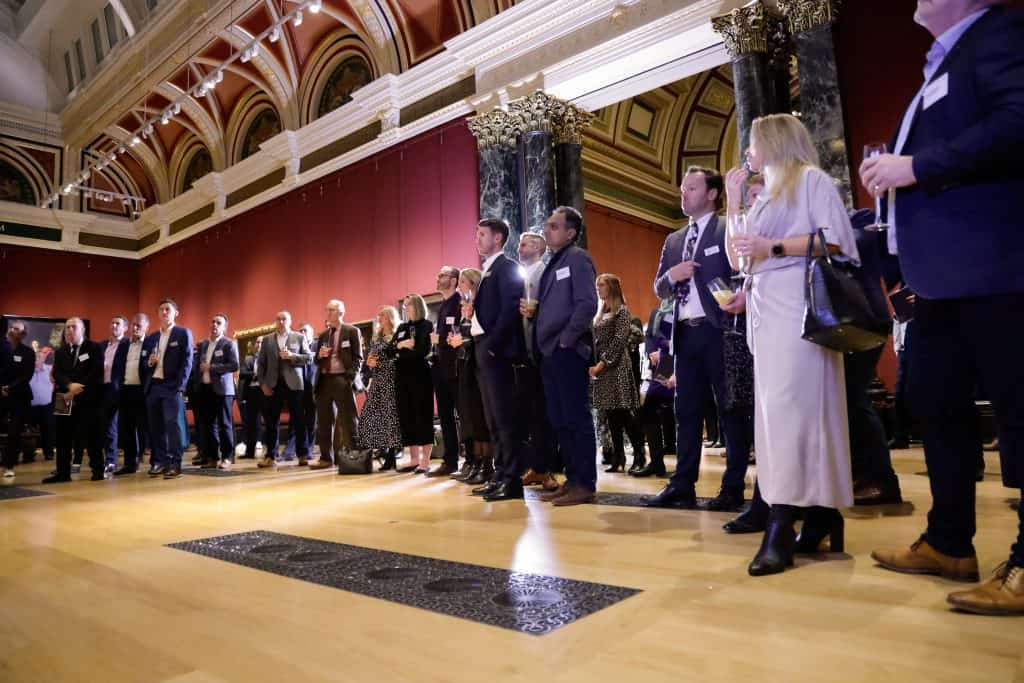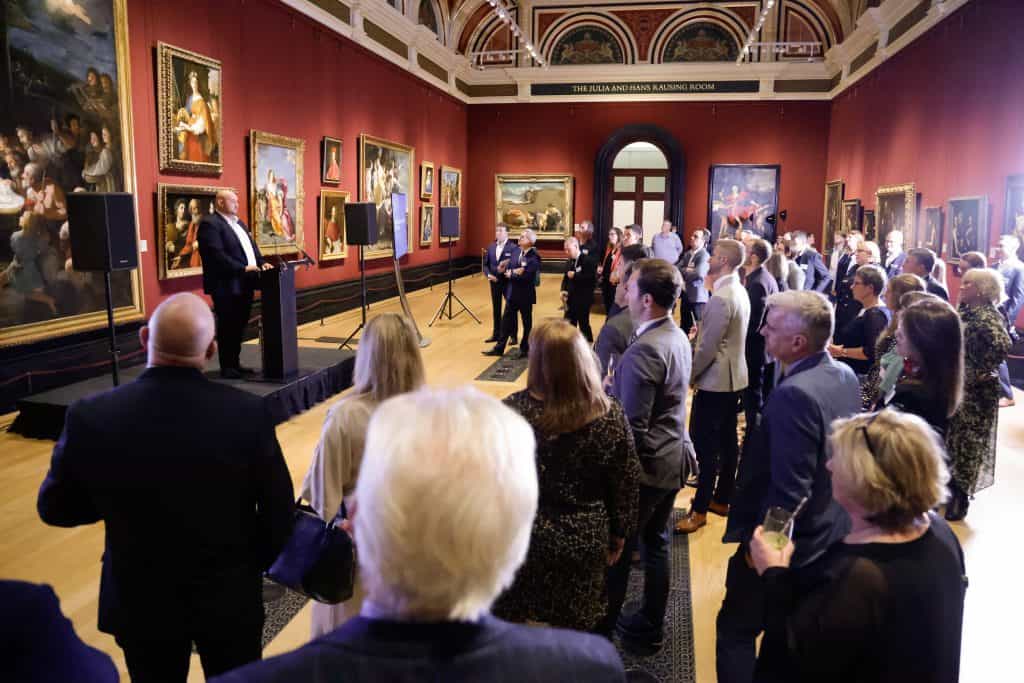On Tuesday 23rd November, Willmott Dixon and Willmott Dixon Interiors officially launched the 5th generation of the Scape Construction Framework at a special event in London.
We were proud to host an audience of customers and stakeholders at the iconic Grade I listed building, The National Gallery.
It was a fitting choice of venue: our team recently completed the refurbishment of Room 32, as well as some significant alterations to create modern working areas behind the scenes.
Delegates heard from Graham Shaw, managing director of Willmott Dixon Interiors about our longstanding relationship with Scape and appointment to the framework.
He was joined by Willmott Dixon’s Group chief executive, Rick Willmott, as well as Mark Robinson, chief executive of Scape and Alasdair Reisner, chief executive of the Civil Engineering Contractors Association (National).

Above: Graham Shaw, Willmott Dixon Interiors managing director during his opening speech.
A Construction Playbook partnership
The launch event marked the extension of a hugely successful partnership between Scape and Willmott Dixon spanning more than 15 years, as Graham Shaw explained.
“I act as the lead conduit between Scape and the Willmott Dixon business nationally,” said Graham. “My focus is on ensuring the continuation of the collaboration between us and that we build upon what we have achieved together to date.”
There are many benefits to being on the construction framework for England and Wales.
It provides a quick to market, OJEU compliant contracting mechanism for construction projects valued between £7.5m and £75m. And our track record with Scape is impressive.
“We have delivered more than 575 projects on behalf of 250 different customers around the country,” added Graham, “at a combined value of £5.7 billion, which is staggering.”
Feedback has also been consistently high. We have achieved an average customer satisfaction score of 9/10 in that time.
Before introducing the evening’s other keynote speakers, Graham took the opportunity to set the scene for a wider discussion around the Construction Playbook.
He said: “It is something which we believe will drive major change across the industry, through greater collaboration, better strategic relationships and through value driven procurement routes.”

Delegates networking in the newly refurbished Room 32
The new rules of the game
The Construction Playbook sets out key policies and guidance for how public works projects and programmes are assessed, procured and delivered.
In effect, it aims to take all of the existing good practice in the sector and provide a guidebook for anyone that’s taking those projects forward. According to Alasdair Reisner, it’s the “new rules of the game”.
“It was put together because we’ve recognised that the industry isn’t working as well as it could be,” said Alastair.
“It is saying: this is how you should do it if you want to deliver the best possible outcomes and achieve the best possible value for the customer, end user and for the industry. We’re looking at an industry that is going through an industrial revolution.”
Many would agree with Alasdair’s sentiments. The construction industry is arguably in the process of experiencing the most radical change it has ever seen, and whilst it’s change that is being driven by several forces, two particularly stand out: carbon and modern methods of construction.
“Clearly, we have to get carbon out of the construction industry as every other industry does at the moment, but we also need to do what we ‘do’ better,” commented Alasdair.
“Historically, we’ve had a really unsustainable supply chain. We’ve seen some really big failures of firms and we can’t let that happen because it’s not just about keeping businesses in business, it’s about keeping people in jobs and looking after those people.”
As a sector, we are creating an increasing amount offsite in a controlled, safe environment, which is brought together on site or through an assembly process.
We are also likely to see a big boost in digitalization of the sector as a result but how sustainable are these initiatives?

Alasdair Reisner, chief executive of the Civil Engineering Contractors Association
Providing a viable future for construction
The construction industry has something of an unwelcome track record of initiatives and change that it has tried to deliver. This is not something that Alasdair feels will happen this time.
He said: “The important bit in all of this is that it’s 100% backed by the UK government. That drive means that this will happen rather than being another dusty report that sits on the shelves and doesn’t get implemented.
“The Playbook is designed to ensure that the industry has a viable future and that it delivers better results for the customer.”
The Playbook aims to deliver that future through 14 areas of priority, including visible pipelines, commercial arrangements that promote better behaviours, and appropriate measures to manage that process.
What does the future look like for the construction industry, if it doesn’t adopt them?
“It’s unfortunately a continuation of where we’ve been before, and that isn’t a status quo – that’s probably a downward trend,” said Alasdair.
“Some of the challenges that we’ve seen in the industry around a demographic of the workforce that’s aging, around some of the commercial disputes that were happening in the industry – they’re not getting better, they’re getting worse. There is a role for everyone within every business to play a part in delivering the Playbook.”
Changing the structure of public procurement
The Construction Playbook plays a part in the government’s green paper on procurement.
It sets out a plan to fundamentally change the structure of public procurement, signalling major changes ahead for buyers such as SCAPE, with key changes including:
- Using new methods of procurement
- Buyers don’t have to select the lowest bid
- Implementation of a National Procurement Policy to act as the golden thread
- More procurement innovation
- Reduction in late payments which is pertinent to the construction industry
The Construction Playbook complements these reforms by setting out 14 non-legislative policies and guidance for ‘how’ the government should deliver public works projects and programmes.
So, what are the key opportunities for SCAPE and Willmott Dixon?
- Publication of commercial Pipelines: all central government departments to publish their commercial pipelines for consolidation
- Portfolios and longer term contracting: longer term view on programmes of work where it is appropriate for efficiency and value
- Early supply-chain involvement: supply-chain should be consulted during business case planning for projects and programmes
- Delivery Model Assessments: evidence based approach to deciding on the most appropriate delivery model
- Effective contracting: contracts will be required to support collaboration and the policy areas of the playbook

Becoming Playbook compliant
Scape has grown substantially in the last decade and now operates 13 frameworks with 41 service offerings across 26 different partners.
As Mark Robinson explained however, Willmott Dixon is the framework’s only signature partner.
“We have worked with Willmott Dixon almost from the very beginning,” he said, “and I am very proud to say we couldn’t have achieved the success to date without the Willmott Dixon partnership.”
We are developing two specific initiatives in partnership with Scape, which are helping both parties to become “Playbook compliant”.
The first is about supporting the value toolkit that is being developed by the Construction Innovation Hub. Scape has supported the development of the toolkit and is committed to seeing it adopted across the country.
“As one of our key framework partners, Willmott Dixon has been an important player in our journey toward adopting the value toolkit in our construction frameworks,” said Mark.
“The toolkit represents a step change in the way the construction industry defines and measures the value created in projects. The toolkit also helps to identify the client’s appetite to create economic, social, human and environmental value.
“Willmott Dixon is leading on our live pilots of the toolkit as we have embedded it in our new construction framework process. This really is vital work.”

Mark Robinson, chief executive of Scape speaking to the delegates about Construction Playbook
Delivering high-performing, sustainable buildings
The second initiative Mark spoke of is the Life Cycle, which was created because Scape believed that the construction contract had to develop.
Mark explained: “The Life Cycle call-off route gives clients an adapted procurement and project delivery pathway, designed to ensure optimal building performance following construction or refurbishment.
“We envisage it will be especially useful in delivering high performing, truly sustainable new buildings, and performance-linked retrofit and refurbishment projects.”
Willmott Dixon is chairing Scape’s strategic project group to deploy and develop the new, innovative Life Cycle delivery approach, as well as delivering projects with Life Cycle costs.
Evolving the conversation on every future public sector project is long overdue, according to Rick Willmott. That includes everything from the way customers procure their buildings from ‘lowest price only’, to the ‘outcomes’ each project will deliver in the longer term.
He said: “The thought that customers will shift their approaches to become aligned to the Playbook’s 14 key policies, is reassuring and timely.
“It will allow designers and contractors to invest and change their strategies, products and services, to deliver what customers actually want in the wider sense and the longer term.
“It will enable buildings that deliver exceptional results for those that occupy them and the environment and communities that are impacted by them, during and after, the design and construction stages, and will demonstrate the importance of the link between environment and society.”

Willmott Dixon’s Group chief executive, Rick Willmott
Better, faster, greener
Given the urgency, Willmott Dixon has been working alongside fellow contractors, consultants and the Cabinet Office for the last two years, to help design and launch the new Construction Playbook.
Work is already underway – alongside Scape and its partners – to make the Playbook our blueprint for tackling these issues alongside our mutual customers.
He said: “In collaboration with Scape, we’ve looked at every one of the 14 key policies individually, and are in the process of updating our people, processes and tools to ensure every customer has confidence that we – and they – are completely aligned to the Playbook, as well as the Procurement Bill, when it’s released in spring 2022. In a nutshell, if you procure with us through Scape, you’re guaranteed Playbook compliance and best practice.”
The Construction Playbook unlocks the full potential of the approaches and solutions that Willmott Dixon and Scape have been developing in partnership with customers, from very early engagement to extended aftercare services.
“With social, sustainable, whole life and economic value no longer playing second fiddle to ‘lowest price only’, we very much welcome the opportunity to partner with many of you and Scape to deliver the enhanced, wider range of value expected by the Construction Playbook,” added Rick.
